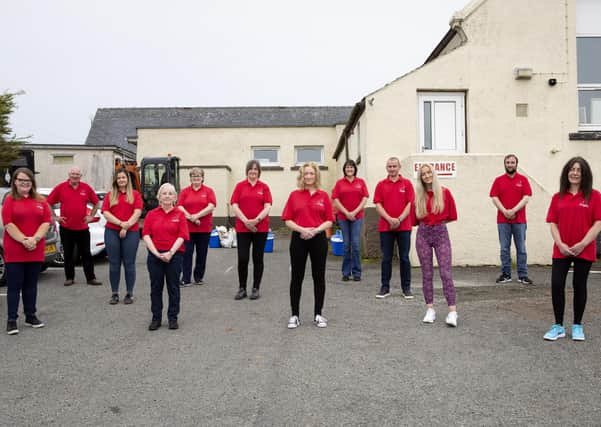A remarkable task by just 41 volunteers


Point and Sandwick Trust’s pandemic services latest report shows that they supplied a total of 5,110 cooked meals to people in need.
It has also been revealed that 3,373 emergency food parcels were provided, 1,556 grocery deliveries made, with a total of 260 households across 30 settlements benefiting from some form of help.
Advertisement
Hide AdAdvertisement
Hide AdIn all, 41 people volunteered with the pandemic response – including 17 volunteers who delivered the seven-days-a-week meal service and a further eight who were trained up for the telephone befriending project.
The main beneficiaries, the report reveals, were in the 71-80 and 81-90 age brackets and a total of 5,220 miles were covered by the delivery service drivers undertaking the voluntary service.
These are some of the key facts revealed in a new report by Point and Sandwick Trust community consultant Alasdair Nicholson, which details the outcomes of the community wind farm organisation’s response to the Covid 19 pandemic.
In the report, entitled ‘Point and Sandwick response to Covid 19 Pandemic: A case study in Leadership and Resilience’, Alasdair revealed the extent of the community assistance facilitated by the wind farm and its general manager, Donald John MacSween.
Advertisement
Hide AdAdvertisement
Hide AdThe report is set against the backdrop of ‘food insecurity’ as a humanitarian issue and explains why PST, although not normally engaged in direct service delivery as opposed to facilitating other community action, felt moved to assume a leadership role when the coronavirus threat appeared in March this year.
In doing so, PST – which runs the Beinn Ghrideag wind farm on the outskirts of Stornoway for the sole benefit of the community – met two of its key roles, which are to help people who are disadvantaged and to alleviate poverty.
Initially, the wind farm organisation responded to the pandemic with £5,000 grants to local community councils to enable them to take targeted action, initiated the local production of PPE for hospitals and care homes, and provided a substantial grant of £40,000 to NHS Western Isles.
But it then secured – with the help of Alasdair who made the funding applications – £55,600 from Highlands and Islands Enterprise through the Supporting Communities Fund for a food and medicine delivery service to vulnerable people and a further £55,525 for outreach telephone support and a cooked meal service from the Scottish Government’s Wellbeing Fund.
Advertisement
Hide AdAdvertisement
Hide AdInto the future, the telephone befriending will continue, after £5,000 was obtained through Urras Storas an Rubha to set it up as an independent project, to be known as Caraidean an Rubha agus Sanndabhaig (CARAS). Also, some additional monies have been secured from Highlands and Islands Enterprise to enable the continuation of food or fuel provision to those in need in the short term.
A survey of the pandemic services beneficiaries was carried out in September. It revealed that 54 per cent had accessed meals, 39 per cent the shopping delivery service and seven per cent befriending.
The survey also indicated the range of conditions experienced by project users, with the biggest overall problems being impairment, mobility difficulties, fatigue, medical issues and shopping issues.
Report author Mr Nicholson said: “Everybody who has been involved in the project – from the board of Point and Sandwick Trust to Donald John MacSween and all the volunteers and the steering group – they all worked together. I think that team work has been the foundation of the success of the project.
Advertisement
Hide AdAdvertisement
Hide Ad“It far surpassed what we thought was the need and the demand way back at the beginning, and the fact that everybody was able to deliver that kind of result speaks volumes for the efforts but it also demonstrates that there was a need for this project at a critical time.
“There are other communities, other projects elsewhere in Scotland, who produced meals and help for people – some one day a week; some three days a week – but I don’t think there were many who delivered the seven-day support that went out with this project consistently.
“The other crucial thing, I think, was the availability of the chief cook and his efforts to help deliver the quality of what was being prepared, the delivery boys and the volunteers who delivered the meals. The two projects – the meal deliveries plus the food deliveries – worked together and complemented each other. The whole effort more than delivered what we hoped to achieve when the project was right in the early stages.”
The report can be read in full at http://www.pointandsandwick.co.uk/wp-content/uploads/2020/10/Point-and-Sandwick-Response-to-Covid-19-Pandemic-1.pdf